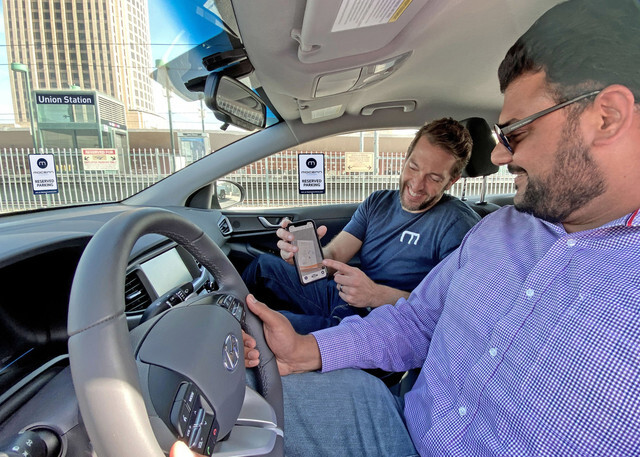Posted on : Jan.6,2020 16:51 KST
 |
|
David Gallon, Mocean Lab’s vice president for strategy and growth, explains how to use the Mocean Carshare app to a user in Los Angeles in front of the city’s Union Station. (provided by Hyundai Motor Group)
|
City provides optimal environment for testing mobility services
 |
|
David Gallon, Mocean Lab’s vice president for strategy and growth, explains how to use the Mocean Carshare app to a user in Los Angeles in front of the city’s Union Station. (provided by Hyundai Motor Group)
|
The time was the morning of Jan. 4 at a transfer parking facility near Union Station on the Los Angeles subway. Dressed in T-shirts, employees of car sharing businesses were nimbly navigating the “Mocean Carshare” apps loaded onto their mobile phones. As the startup page opened, information about the nearest shared vehicles was displayed based on user position data. The entire process of finding the vehicle, opening the door by mobile phone, and starting the ignition took less than five minutes.
The Mocean Carshare service was launched in LA last November by the Hyundai Motor Group. The basic operation is similar to that of the South Korean carsharing service Socar. A major factor behind the Hyundai Motor Group’s decision to launch its carsharing service in LA was the city’s status as a “test bed.” It is the second-largest city in the US, after New York. It deals with serious traffic congestion and has been the focus of concerted efforts to relieve traffic issues, with around 90 transportation-related startups drawing US$6 billion in investment. With the city scheduled to host the Summer Olympics in 2028, municipal authorities have been taking steps to improve the transportation environment. On this basis, observers have rated it as having an optimal environment for testing future mobility.
The Hyundai Motor Group’s carsharing service is now poised for an official launch in mid-January after a two-month test operation in the US. The group recently established the next-generation mobility venture Mocean Lab in LA for the project. The venture is to be used not just for carsharing but for testing of a wide range of mobility services including robo-taxis, shuttle sharing, multimodal and personal mobility, and urban air mobility (UAM).
Mocean Lab service usage fees amount to US$12 per travel hour (including fuel) along with a US$12 enrollment fee. Travel over the same distance would cost US$7 by subway or bus (while taking around two hours including wait times) and US$60 by taxi or Uber. Once a minute-based fare system takes effect in March, the cost will come down to just US$4 for a 20-minute trip. Observers have lauded the system as cutting bus, subway, and other public transportation travel times to a third while maintaining similar costs, and establishing cost-competitiveness with rates amounting to one-eighth of taxi fares.
“We’ve been providing the service to preliminary applicants as a test run since late November of last year, and the response has been even more positive than we anticipated,” said David Gallon, Mocean Lab’s vice president for strategy and growth.
In addition to examining the feasibility of future mobility services with its carsharing testing at Mocean Lab, the Hyundai Motor Group is also looking forward to the benefits of increased brand awareness, individual model promotion, and boosted sales.
Issue of profitability remains major question
It remains to be seen how smoothly the project will establish itself. Some of the competitors that arrived first in the US carsharing market have already been bowing out amid struggles with declining profitability. BMW’s DriveNow service has pulled out of San Francisco, while GM has been scaling down its Maven service. The service car2Go, launched in Miami in 2016, shut down due to profitability issues. Most of the services have faced issues with securing lot space or declining usage amid complaints of diminishing user convenience. Mocean Lab explained that it is working to resolve such issues through cooperation with city authorities, including the LA Metropolitan Transportation Authority.
“We’ve been watching very closely the situation facing other businesses,” said Jung Hun-taek, director of the mobility project office for the Hyundai Motor Group’s strategic technology headquarters.
“We’re not focusing too much on immediate profitability. Our plan is to improve our manufacturing capabilities in conjunction with services to expand our range of future mobility service products,” Jung explained.
The Hyundai Motor Group also took its first step into mobility services domestically with the recent establishment of “Mocean” as an integrated mobility management solutions business. In reflection of the South Korean environment, it opted for an approach of supporting the operation of car rental businesses.
By Hong Dae-sun, senior staff writer
Please direct comments or questions to [english@hani.co.kr]









